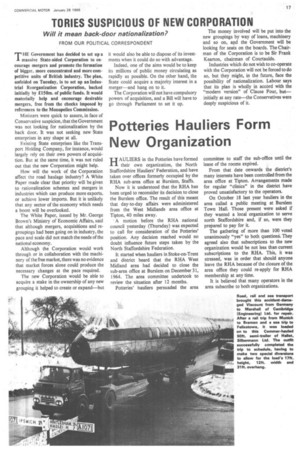TORIES SUSPICIOUS OF NEW CORPORATION
Page 19

If you've noticed an error in this article please click here to report it so we can fix it.
Will it mean back-door nationalization?
FROM OUR POLITICAL CORRESPONDENT PTI HE Government has decided to set up a massive State-aided Corporation to encourage mergers and promote the formation of bigger, more concentrated and more competitive units of British industry. The plan, unfolded on Tuesday, is to set up an Industrial Reorganization Corporation, backed initially by £150m. of public funds. It would materially help and encourage desirable mergers, free from the checks imposed by references to the Monopolies Commission.
Ministers were quick to assure, in face of Conservative suspicion, that the Government was not looking for nationalization by the back door. It was not seeking new State enterprises in any shape at all.
Existing State enterprises like the Transport Holding Company, for instance, would largely rely on their own powers of acquisition. But at the same time, it was not ruled out that the new Corporation might help.
How will the work of the Corporation affect the road haulage industry? A White Paper made clear that priority will be given to rationalization schemes and mergers in industries which can produce more exports, or achieve lower imports. But it is unlikely that any sector of the economy which needs a boost will be overlooked.
The White Paper, issued by Mr. George Brown's Ministry of Economic Affairs, said that although mergers, acquisitions and regroupings had been going on in industry, the pace and scale did not match the needs of the national economy.
Although the Corporation would work through or in collaboration with the machinery of the free market, there was no evidence that market forces alone could produce the necessary changes at the pace required.
The new Corporation would be able to acquire a stake in the ownership of any new grouping it helped to create or expand—but it would also be able to dispose of its investments when it could do so with advantage.
Indeed, one of the aims would be to keep its millions of public money circulating as rapidly as possible. On the other hand, the State could acquire a majority interest in a merger—and hang on to it.
The Corporation will not have compulsory powers of acquisition, and a Bill will have to go through Parliament to set it up. The money involved will be put into the new groupings by way of loans, machinery and so on, and the Government will be looking for seats on the boards. The Chairman of the Corporation is to be Sir Frank Kearton, chairman of Courtaulds.
Industries which do not wish to co-operate with the Corporation will not be forced to do so, but they might, in the future, face the possibility of nationalization. Labour says that its plan is wholly in accord with the "modern version" of Clause Four, but— initially at any rate—the Conservatives were deeply suspicious of it.












































































































